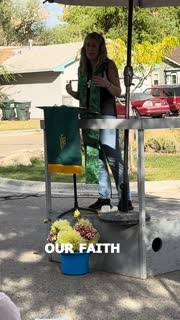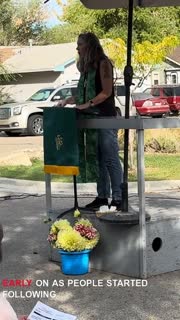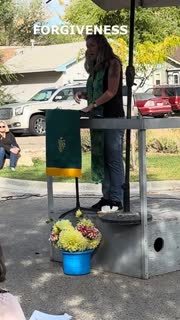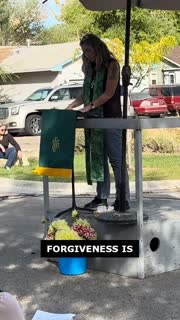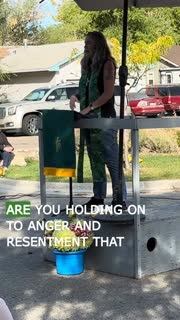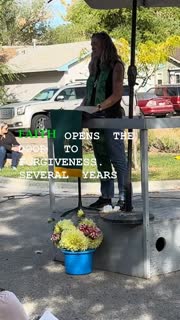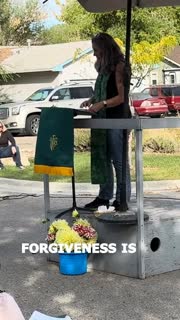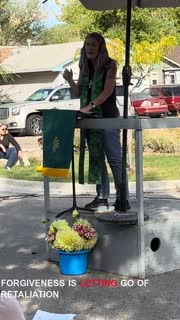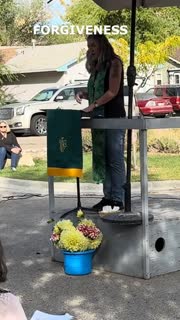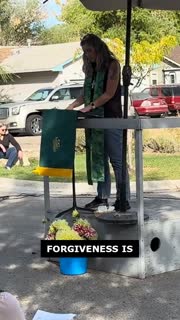Faith's Power: Embracing the Journey of Forgiveness
Devotional
Sermon Summary
Bible Study Guide
Sermon Clips
1. "Our faith fundamentally is remember what God has done for us, remember the promises God has made and remember that God is faithful. And so being a remembering people we do things like worship outside now and then and try to remember how did we do this where are the chairs how do we set up av so we're going to find out as we go what we forgot." [01:36] (26 seconds)
2. "Early on as people started following Jesus, not just following Jesus, but being imitators of God modeling their life after Jesus, they became known as the followers of the way. The first Christians were not called Christians, they were called followers of the way. Their worship was different. They didn't go down to the local temple and sacrifice to idols. For them, their worship happened at a specific time. And they all got together, and they worshiped together. And each one of the worshipers would have to go up and down the stairs at read together, and they ate together, and then they all left. they were different. They were compassionate to strangers. They cared for the sick. They visited those in prison. And they were forgiving. They were different. Forgiveness, early on, is named as a mark of a Christ follower. And not just any forgiveness, but radical, enemy-focused forgiveness." [14:34] (61 seconds)
3. "Forgiveness is the intentional decision to let go of resentment and anger. When we are wrong, when we are hurt, we get angry, of course. If amends are not made immediately, we get resentful, of course. Those are natural and healthy responses to being hurt. So, initially, anger and resentment are not the problem. In St. Paul's instruction, he says, be angry without sinning. The problem is what we do with those feelings, holding on to them, letting them drive us to retaliation, to repaying evil for evil. Forgiveness is letting go of anger and resentment." [17:31] (53 seconds)
4. "Forgiveness is tricky. And it's necessary. Faith opens the hand to , your door to forgiveness. Resentment and anger become a cancer eating us up, changing us. And forgiveness is God's gift that sets us free. Faith opens the door to forgiveness. Now scripture tells us why we are to forgive, why we are to let go of resentment and anger and to be set free. And it's not because the offense was not that bad. It's not because the wrongdoer deserves it. It's because God forgives. Because Jesus forgives. Because we are called to be imitators of God. God who forgives us when we didn't deserve it. St. Paul says, be kind, compassionate, and forgiving to each other in the same way God forgave you in Christ. We forgive not because of anything the wrongdoer did, but because Jesus forgave us. And we are Jesus' apprentices. Modeling our life after Christ, and so we forgive. Faith opens the door to forgiveness." [21:23] (79 seconds)
5. "Are you holding on to anger and resentment that you need to forgive, that you need to intentionally let go of? Not because anybody did something, the wrongdoer did anything, but because you've been doing it for a long time. And you've been called by faith to let go. To let go of anger and resentment. Forgiveness is not easy, but it is a mark of a Christ follower. Faith opens the door to forgiveness." [29:24] (32 seconds)
6. "Faith opens the door to forgiveness. Several years ago, there was a story in the paper of a police officer who'd been shot in the face. He was, you know, going out on a call, knocked on the door. A teenager opened the door and shot him in the face. Amazingly, he survived with permanent disability. So the teenager was tried and convicted, and at this sentencing, the officer's wife went over to this young person and took his hands in hers and said, these are the hands that pulled the trigger that shot my husband. God can use these hands to do great good. Faith opens the door to forgiveness." [24:34] (52 seconds)
7. "Forgiveness is an important part of Christ-like living. St. Paul goes on to say, be angry without sinning. Did you catch that? Be angry without sinning. Be kind, be compassionate, be forgiving. Faith opens doors to forgiveness. In 1 Peter, we hear, do not repay evil for evil for evil. In the letter to the Romans, we hear, bless those who persecute you. Do not repay anyone evil for evil. Jesus taught about forgiveness. And this rejection of retaliation, rejection of vengeance, Matthew 5 and Luke 6, Jesus says, love your enemies and do good to those who hate you. It's radical. Forgiving those who don't deserve it." [15:34] (55 seconds)
8. "Forgiveness is letting go of retaliation while still holding the wrongdoers accountable. Forgiveness is tricky. And it's necessary. Faith opens the hand to , your door to forgiveness. Resentment and anger become a cancer eating us up, changing us. And forgiveness is God's gift that sets us free. Faith opens the door to forgiveness. Now scripture tells us why we are to forgive, why we are to let go of resentment and anger and to be set free. And it's not because the offense was not that bad. It's not because the wrongdoer deserves it. It's because God forgives. Because Jesus forgives. Because we are called to be imitators of God. God who forgives us when we didn't deserve it. St. Paul says, be kind, compassionate, and forgiving to each other in the same way God forgave you in Christ. We forgive not because of anything the wrongdoer did, but because Jesus forgave us. And we are Jesus' apprentices. Modeling our life after Christ, and so we forgive. Faith opens the door to forgiveness." [21:23] (85 seconds)
9. "Forgiveness is the intentional decision to let go of resentment and anger. When we are wrong, when we are hurt, we get angry, of course. If amends are not made immediately, we get resentful, of course. Those are natural and healthy responses to being hurt. So, initially, anger and resentment are not the problem. In St. Paul's instruction, he says, be angry without sinning. The problem is what we do with those feelings, holding on to them, letting them drive us to retaliation, to repaying evil for evil. Forgiveness is letting go of anger and resentment. And forgiveness is hard for everybody, even the disciples, with the story that we shared this morning. At Jesus' group, they were rejected because they were Jews. The disciples were rejected because they were Jews. The disciples were rejected because they were wanted vengeance. Jesus said, none of that. No vengeance. No repaying evil for evil. Let go. Move on." [17:31] (77 seconds)
10. "Forgiveness is tricky. And it's necessary. Faith opens the hand to , your door to forgiveness. Resentment and anger become a cancer eating us up, changing us. And forgiveness is God's gift that sets us free. Faith opens the door to forgiveness. Now scripture tells us why we are to forgive, why we are to let go of resentment and anger and to be set free. And it's not because the offense was not that bad. It's not because the wrongdoer deserves it. It's because God forgives. Because Jesus forgives. Because we are called to be imitators of God. God who forgives us when we didn't deserve it. St. Paul says, be kind, compassionate, and forgiving to each other in the same way God forgave you in Christ. We forgive not because of anything the wrongdoer did, but because Jesus forgave us. And we are Jesus' apprentices. Modeling our life after Christ, and so we forgive. Faith opens the door to forgiveness." [21:23] (79 seconds)
Ask a question about this sermon
2. "Early on as people started following Jesus, not just following Jesus, but being imitators of God modeling their life after Jesus, they became known as the followers of the way. The first Christians were not called Christians, they were called followers of the way. Their worship was different. They didn't go down to the local temple and sacrifice to idols. For them, their worship happened at a specific time. And they all got together, and they worshiped together. And each one of the worshipers would have to go up and down the stairs at read together, and they ate together, and then they all left. they were different. They were compassionate to strangers. They cared for the sick. They visited those in prison. And they were forgiving. They were different. Forgiveness, early on, is named as a mark of a Christ follower. And not just any forgiveness, but radical, enemy-focused forgiveness." [14:34] (61 seconds)
3. "Forgiveness is the intentional decision to let go of resentment and anger. When we are wrong, when we are hurt, we get angry, of course. If amends are not made immediately, we get resentful, of course. Those are natural and healthy responses to being hurt. So, initially, anger and resentment are not the problem. In St. Paul's instruction, he says, be angry without sinning. The problem is what we do with those feelings, holding on to them, letting them drive us to retaliation, to repaying evil for evil. Forgiveness is letting go of anger and resentment." [17:31] (53 seconds)
4. "Forgiveness is tricky. And it's necessary. Faith opens the hand to , your door to forgiveness. Resentment and anger become a cancer eating us up, changing us. And forgiveness is God's gift that sets us free. Faith opens the door to forgiveness. Now scripture tells us why we are to forgive, why we are to let go of resentment and anger and to be set free. And it's not because the offense was not that bad. It's not because the wrongdoer deserves it. It's because God forgives. Because Jesus forgives. Because we are called to be imitators of God. God who forgives us when we didn't deserve it. St. Paul says, be kind, compassionate, and forgiving to each other in the same way God forgave you in Christ. We forgive not because of anything the wrongdoer did, but because Jesus forgave us. And we are Jesus' apprentices. Modeling our life after Christ, and so we forgive. Faith opens the door to forgiveness." [21:23] (79 seconds)
5. "Are you holding on to anger and resentment that you need to forgive, that you need to intentionally let go of? Not because anybody did something, the wrongdoer did anything, but because you've been doing it for a long time. And you've been called by faith to let go. To let go of anger and resentment. Forgiveness is not easy, but it is a mark of a Christ follower. Faith opens the door to forgiveness." [29:24] (32 seconds)
6. "Faith opens the door to forgiveness. Several years ago, there was a story in the paper of a police officer who'd been shot in the face. He was, you know, going out on a call, knocked on the door. A teenager opened the door and shot him in the face. Amazingly, he survived with permanent disability. So the teenager was tried and convicted, and at this sentencing, the officer's wife went over to this young person and took his hands in hers and said, these are the hands that pulled the trigger that shot my husband. God can use these hands to do great good. Faith opens the door to forgiveness." [24:34] (52 seconds)
7. "Forgiveness is an important part of Christ-like living. St. Paul goes on to say, be angry without sinning. Did you catch that? Be angry without sinning. Be kind, be compassionate, be forgiving. Faith opens doors to forgiveness. In 1 Peter, we hear, do not repay evil for evil for evil. In the letter to the Romans, we hear, bless those who persecute you. Do not repay anyone evil for evil. Jesus taught about forgiveness. And this rejection of retaliation, rejection of vengeance, Matthew 5 and Luke 6, Jesus says, love your enemies and do good to those who hate you. It's radical. Forgiving those who don't deserve it." [15:34] (55 seconds)
8. "Forgiveness is letting go of retaliation while still holding the wrongdoers accountable. Forgiveness is tricky. And it's necessary. Faith opens the hand to , your door to forgiveness. Resentment and anger become a cancer eating us up, changing us. And forgiveness is God's gift that sets us free. Faith opens the door to forgiveness. Now scripture tells us why we are to forgive, why we are to let go of resentment and anger and to be set free. And it's not because the offense was not that bad. It's not because the wrongdoer deserves it. It's because God forgives. Because Jesus forgives. Because we are called to be imitators of God. God who forgives us when we didn't deserve it. St. Paul says, be kind, compassionate, and forgiving to each other in the same way God forgave you in Christ. We forgive not because of anything the wrongdoer did, but because Jesus forgave us. And we are Jesus' apprentices. Modeling our life after Christ, and so we forgive. Faith opens the door to forgiveness." [21:23] (85 seconds)
9. "Forgiveness is the intentional decision to let go of resentment and anger. When we are wrong, when we are hurt, we get angry, of course. If amends are not made immediately, we get resentful, of course. Those are natural and healthy responses to being hurt. So, initially, anger and resentment are not the problem. In St. Paul's instruction, he says, be angry without sinning. The problem is what we do with those feelings, holding on to them, letting them drive us to retaliation, to repaying evil for evil. Forgiveness is letting go of anger and resentment. And forgiveness is hard for everybody, even the disciples, with the story that we shared this morning. At Jesus' group, they were rejected because they were Jews. The disciples were rejected because they were Jews. The disciples were rejected because they were wanted vengeance. Jesus said, none of that. No vengeance. No repaying evil for evil. Let go. Move on." [17:31] (77 seconds)
10. "Forgiveness is tricky. And it's necessary. Faith opens the hand to , your door to forgiveness. Resentment and anger become a cancer eating us up, changing us. And forgiveness is God's gift that sets us free. Faith opens the door to forgiveness. Now scripture tells us why we are to forgive, why we are to let go of resentment and anger and to be set free. And it's not because the offense was not that bad. It's not because the wrongdoer deserves it. It's because God forgives. Because Jesus forgives. Because we are called to be imitators of God. God who forgives us when we didn't deserve it. St. Paul says, be kind, compassionate, and forgiving to each other in the same way God forgave you in Christ. We forgive not because of anything the wrongdoer did, but because Jesus forgave us. And we are Jesus' apprentices. Modeling our life after Christ, and so we forgive. Faith opens the door to forgiveness." [21:23] (79 seconds)
